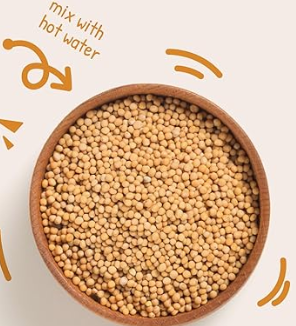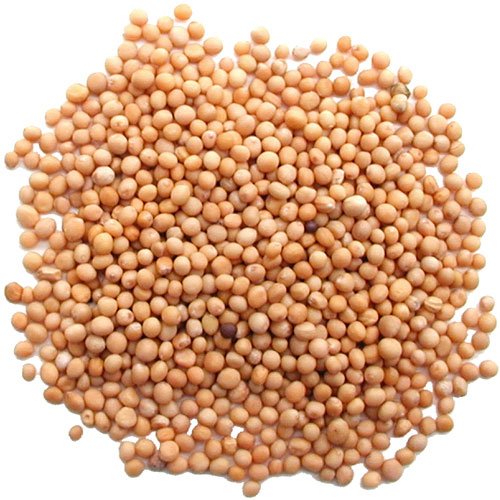Mustard for Heartburn Relief: A Surprisingly Tasty Solution
If you’re tired of dealing with the painful burn of heartburn or acid reflux, you might want to consider an unexpected remedy: mustard. Many people find that eating a spoonful of mustard can provide quick relief from heartburn symptoms. It’s a simple and natural option that may surprise you with its effectiveness.

Mustard has properties that can help neutralize stomach acid, making it a potential ally in your quest for comfort. This yellow condiment isn’t just for burgers and sandwiches; it might just be the answer you’ve been looking for to soothe that irritating burning sensation in your chest.
Curious about how mustard works for heartburn relief and if it’s right for you? This article breaks down everything you need to know, from its nutritional benefits to tips on how to use it effectively.
Key Takeaways
- Mustard may help neutralize stomach acid for heartburn relief.
- There are various remedies, but mustard stands out as a simple option.
- Eating mustard regularly might help reduce the frequency of heartburn symptoms.
Understanding Heartburn and Acid Reflux
Heartburn and acid reflux can be uncomfortable and annoying. Knowing their causes, symptoms, and the role of lifestyle choices can help you manage these conditions.
Causes and Symptoms of Heartburn
Heartburn happens when stomach acid flows back into your esophagus. This can happen for several reasons. One common cause is eating large meals or lying down right after eating. Certain foods can also trigger heartburn, like spicy dishes, chocolate, caffeine, and alcohol.
Common symptoms include a burning sensation in your chest, a sour taste in your mouth, and sometimes even difficulty swallowing. Some people experience a feeling of fullness or indigestion.
Keeping a food diary can help you spot trigger foods that worsen your symptoms. Being aware of these triggers is key to finding relief.
Gastroesophageal Reflux Disease (GERD)
GERD is a more serious form of acid reflux. If you experience heartburn frequently, you might have GERD. This can lead to complications like damage to your esophagus or throat.
Symptoms of GERD can be similar to regular heartburn, but they often occur more often and may include chronic cough or a sore throat. If your heartburn is severe or occurs more than twice a week, it’s a good idea to consult a doctor.
Managing GERD often requires dietary changes, medications, and sometimes lifestyle modifications. Identifying patterns in your symptoms can guide these changes effectively.
Diet and Lifestyle Factors
Your diet and lifestyle play a big role in heartburn and acid reflux. Certain foods are known as trigger foods that can provoke symptoms. Some common triggers include fried foods, citrus fruits, and carbonated beverages.
Making small changes, like eating smaller meals more frequently, can also help. Avoid lying down after eating to prevent acid from flowing back into your esophagus.
Additionally, consider avoiding tight clothing, which can pressure your abdomen and increase the chance of reflux. Maintaining a healthy weight through exercise and diet can significantly reduce symptoms, setting you on a path to feel better.
The Role of Mustard in Heartburn Relief
Mustard can play a helpful role in managing heartburn. It offers certain properties that may provide relief from those uncomfortable burning sensations in your chest. Let’s explore its anti-inflammatory effects, how it can alleviate heartburn, and the different varieties of mustard that can help.
Mustard and Its Anti-Inflammatory Effects
Mustard contains substances like curcumin and sinigrin. Curcumin, found in some types of mustard, is known for its powerful anti-inflammatory properties. This means it could help reduce irritation in your stomach lining and esophagus, providing some comfort when you experience heartburn.
In addition to curcumin, mustard seeds have omega-3 fatty acids. These fats are known to support your body’s immune response. When your body fights inflammation, it can help lessen the feelings of heartburn. Mustard may also promote wound healing, contributing to a healthier digestive tract.
How Mustard Can Alleviate Heartburn
When you consume mustard, it can interact with stomach acids. Some people find that mustard helps neutralize excess acid thanks to its alkaline properties. This balance can provide quick burn relief, especially during an episode.
To use mustard for heartburn, consider taking a small amount directly or mixing it with something soothing, like buttermilk or honey. These combinations may enhance its effects and make it easier to digest. A popular option is mustard tea, which combines the benefits of mustard with the soothing effects of warm liquids.
Mustard Varieties and Their Benefits
There are different types of mustard, and each offers unique benefits. Yellow mustard is often the most common and easiest to find. It tends to have a milder flavor and acidity, which might make it a suitable option for those looking to ease heartburn.
You can also consider spicy mustard or whole grain mustard, which may offer a bolder taste along with similar benefits. Keeping a variety of mustards on hand lets you experiment and see which one works best for you. Each type can add different flavors to your meals while providing potential heartburn relief.
Comparing Remedies and Treatments
When dealing with heartburn, many people wonder about the best way to find relief. You have options ranging from home remedies to over-the-counter medicines. Each choice comes with its pros and cons, making it important to understand what works best for you.
Home Remedies Versus Over-the-Counter Options
Home remedies for heartburn can be appealing because they often use ingredients you already have. For instance, mustard might help some people due to its alkaline nature, which can neutralize stomach acid. Other popular remedies include ginger tea and probiotics, which may promote digestive health.
On the other hand, over-the-counter options like antacids provide quick relief. Products containing lansoprazole or omeprazole are proton pump inhibitors (PPIs) that reduce acid production. While effective, they may take longer to work compared to home remedies. Balancing these options can depend on personal preference and the frequency of your heartburn.
Potential Risks and Considerations
It’s essential to consider potential risks with any treatment. While mustard and other home remedies may be harmless for most, they aren’t backed by extensive scientific research. For instance, relying solely on mustard for severe heartburn may not be wise.
Over-the-counter antacids can also have drawbacks. Prolonged use of PPIs like omeprazole and lansoprazole may lead to side effects, such as nutrient deficiencies or stomach infections. It’s a good idea to read labels carefully and not exceed the recommended dosage.
When to Consult a Healthcare Provider
You should consult a healthcare provider if your heartburn occurs more than twice a week or if it worsens over time. Persistent heartburn might indicate a more serious condition, like gastroesophageal reflux disease (GERD). Your provider can guide you toward appropriate treatments, whether that’s recommending certain medications or suggesting lifestyle changes.
Don’t hesitate to reach out if you’re uncertain about any remedies you try. Keeping an open conversation with your healthcare provider can lead to more effective management of your heartburn symptoms.
Nutritional Profile and Consumption Tips
When it comes to mustard for heartburn relief, it’s important to know what nutrients it contains and how to best use it in your meals. Mustard can offer some benefits for gastrointestinal health, but understanding its nutritional profile can help you incorporate it wisely into your diet.
Minerals and Vitamins in Mustard
Mustard is packed with several key nutrients. It contains:
- Magnesium: Helps with muscle function and may ease digestive issues.
- Calcium: Important for bone health and also plays a role in digestion.
- Iron: Supports oxygen flow in your body, helping to keep energy levels up.
- Zinc: Promotes a healthy immune system and aids in healing.
- Niacin (Vitamin B3): Beneficial for energy metabolism and can improve digestive health.
- Phosphorus: Supports the formation of bones and teeth.
Mustard’s alkaline properties can help neutralize gastric juices, potentially offering relief from heartburn. It’s low in calories but high in flavor, making it a tasty addition to meals without added fat.
Recommended Dosage and Usage
For instant relief from heartburn, you might consider using about 1 to 2 teaspoons of mustard. It’s best to start small to see how your body reacts.
If you’re prone to dyspepsia or bloating, be cautious with your intake. Spicy mustard might trigger symptoms in some individuals. It’s wise to avoid excessive amounts, as too much mustard can lead to digestive discomfort, such as diarrhea or increased gas. Balance is key.
Incorporating Mustard into Your Diet
You can easily add mustard to your meals. Here are some ways to enjoy it:
- Salad dressings: Mix mustard with vinegar and oil for a tangy dressing.
- Marinades: Add it to your meat marinades to enhance flavor.
- Sandwich spread: Use mustard instead of mayo for a spicier kick on your sandwiches.
If you enjoy cooking, you can also use mustard powder as a seasoning in various dishes. Just remember that the heat from mustard can also stimulate appetite, so use it wisely to avoid overeating.
Frequently Asked Questions
You might have some questions about using mustard for heartburn relief. Here are a few common queries and answers to help you better understand how mustard and other remedies can work for your symptoms.
How can mustard ease symptoms of heartburn?
Mustard may help ease heartburn due to its acidity and anti-inflammatory properties. The vinegar and turmeric in mustard can help soothe your esophagus and balance stomach acid levels.
What are some quick home remedies for heartburn?
If you’re looking for quick relief, some home remedies include drinking a glass of water mixed with baking soda or chewing gum. Herbal teas like chamomile or ginger can also soothe your stomach and help reduce discomfort.
Are there specific types of mustard that are recommended for acid reflux relief?
Yellow mustard is often recommended for heartburn relief because it’s slightly acidic. Some find that Dijon mustard works well too. It’s best to experiment and see which type works for you.
What are some foods that can help neutralize heartburn discomfort?
Foods like bananas, oatmeal, and almonds can help neutralize stomach acid. Non-citrusy fruits and green vegetables are also good choices that may ease your symptoms.
Can a spoonful of mustard really provide quick heartburn relief?
Many people report that taking a spoonful of mustard can provide quick relief from heartburn. It’s worth a try, especially if you’re looking for a simple solution without medication.
What’s an effective old fashioned remedy for heartburn?
An old-fashioned remedy for heartburn is apple cider vinegar mixed with water. Drinking this mixture before meals can help prevent heartburn symptoms if you find it works for you.

